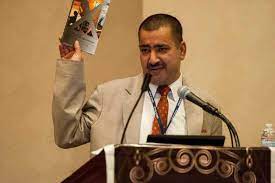Scientific Program

MUSHTAQ CHALKOO
Government Medical College, India
Title: LAPAROSCOPIC SURGERY; THE CURRENT SCENARIO
Biography:
Mushtaq Chalkoo is Working as Additional/associate professor at GMC Srinagar from 22 Oct,2017 Working as Assistant Professor Surgery at GMC, Srinagar from 2012- oct 2017 Worked as Permanent Lecturer Surgery at GMC, Srinagar from 2009 2012 Worked as Adhoc Lecturer Surgery at GMC, Srinagar from 2007 2009 Worked as Assistant Surgeon at SDH, Tangmarg from 2003,2007 Worked as Resident Surgeon at KSA from 2001 “ 2003 Worked as Senior Resident Surgery & Allied Specialties at SKIMS from 1997" 2001 Postgraduate Surgery, SKIMS from 1994, 1997 House Surgeon from 1993, 1994 Internship in GMC, Srinagar from 1992,1993.
Abstract
Surgery is an art and this art of healing is learnt over a period of time. Early 1980’s brought a revolution in the field of surgery and there has been a continuous growth in this field due to rapid run of modifications and innovations that keep on happening for the patient good. Gone are the days when surgery would be abhorred by patients as a modality of treatment for their ailments. Currently patients look out for surgical treatments even for their medical ailments. Minimal access surgery and laparoscopy changed the whole scenario of surgery. The many do’s and don’ts got changed in surgery; amounting to up rise of a new religion in the field of surgery. The conventional surgery would explore a patient through a formal incision which would entail more of blood loss, paramount pain, exposure to lot of drugs, prolonged recovery time and lengthy hospital stay. Thanks to laparoscopy many surgical procedures have become ambulatory procedures, day care surgeries and office procedures. In today’s era, patient is operated through holes and video guided with a fast recovery, shortened hospital stay and early recovery. Laparoscopic staplers have revolutionised the dissection techniques in colorectal cancer surgeries. The staplers have not only reduced the operative time but also help in fashioning precise anatomises and decreased blood loss. There has been a tremendous advancement in instruementation, operational theatre technology and other surgical gadgets that have made the techniques and mode of surgery quite awesome. Laparoscopic management of incisional hernias have undergone a total metamorphosis and techniques like IPOM PLUS and component separation techniques have revolutionised the management of this
surgical ailment. There has been tremendous advancement in meshes used in incisional hernias that are patient friendly. Laparoscopic management of rectal tumours especially the low rectal tumours are now managed even without covering colostomies which many patients would not be ready to accept. The Robotic surgery is an extension of laparoscopic surgery and it has already invaded many fields of surgery with excellent outcome. What will be future in surgery cannot even be guessed.Telesurgery is already practiced at present. We have grown enormously in Kashmir valley with this patient friendly technique and laparoscopic gastrointestinal surgeries, especially laparoscopic colorectal and gastric surgeries and all kinds of hernias are managed laparoscopic ally at deptt.of surgery govt.medical college Srinagar. Every other day, there is a new blast of innovation in the field of laparoscopic surgery and it has become difficult to cope up with the advancement of this art of surgery. Technology has put us at cutting edge and it is mandatory to update yourself as we are medical teachers too. We at medical college have been working with laparoscopic surgery since late 1990’s and have come a long way ahead in this field. We have contributed our patents, techniques, modifications and chapters and publications in the field of laparoscopic surgery. The Chalkoo’S Point, The Chalkoos Single Finger Technique, The Chalkoos Modification, The Chalkoos Concepts etc. are worth mentioned here. We have presented our work nationally internationally as invited talks. It is a moral duty of all of us as medical teachers to decipher and disseminate this art of surgery to the upcoming young budding doctors who would carry on this legacy of surgery to the future progeny for the good of
- Critical Care
- Emergency Medicine
- Critical Care Nursing
- Critical Care Medicine
- Neuro Critical Care
- Emergency Nursing
- Emergency Medicine
- Emergency Drugs and Its Administration
- Emergency Medical Services Market
- Pediatric Emergency medicine

